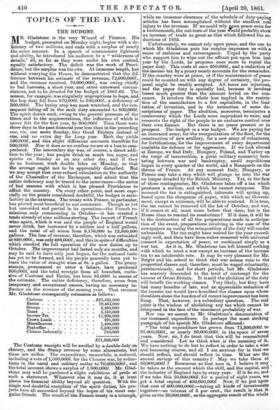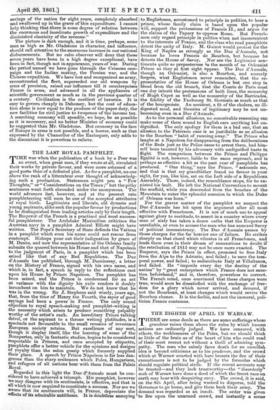TOPICS OF THE-DAY.
THE BUDGET.
MR. Gladstone is the very Wizard of Finance. His budget, presented on Monday night, begins with a de- liciency of two millions, and ends with a surplus of nearly the same amount. In a speech of consummate lightness and ability, he introduced his audience to a " wilderness of details," all, so far as they were under his own control, equally satisfactory. The deficit was the work of Provi- dence, but the surplus was his own. At immense length, but without wearying the House, he demonstrated that the dif- ference between his estimate of the revenue, 72,000,0001., and the revenue received, 70,000,0001., was owing chiefly to bad harvests, a short year, and other untoward circum- stances, not to be dreaded for the budget of 1861-62. The season, for example, was singularly unpropitious to hops, and the hop duty fell from 870,0001. to 580,0001., a deficiency of 300,0001. The'barley crop was meat wretched, and the con- asqaent falling off in the malt duty amounted to 800,000/. The spirit duties sank, owing to the general pressure of the times and to the augmentations, the influence of which is never felt for the first year, by 900,0001. Then there were three days in the past financial year less than in the preceding one, viz. one more Sunday, two Good Fridays instead of one, and no extra day for Leap year. Each day yields 100,0001., and this slight difference accounts therefore for 800,0001. How it does so we confess we are at a loss to com- prehend. The intercalary day was, of course, a direct addi- tion to the year; but people drink as much tea, sugar, and spirits on Sunday as on any other day, and if they do no business, work double tides on Monday, so that the average ought not to be appreciably disturbed. But we may accept that over-refined calculation on the authority of the Chancellor of the Exchequer, and admit that the entire deficiency may be traced to the same cause—the series of bad seasons with which it has pleased Providence to afflict the country. On every other point, and more espe- cially on the points considered doubtful, the budget is satis- factory in the extreme. The treaty with France, in particular, has proved most beneficial to our commerce. Though as yet but one-sided and partial in its operation—the French re- missions only commencing in October—it has created a trade already of nine millions sterling. The import of French wine again, which it was said the people of England would never drink, has increased by a million and a half gallons, sad the total of all wines from 9,176,000 to 12,500,000 gallons. The loss of revenue, therefore, which was estimated at 850,0001., wasonly493,000/., and this in spite of difficulties which checked the full operation of the new duties up to October. The improvement had lasted only six months, and may be said to have only just begun, for the national taste has yet to be formed, and the people generally have yet to learn the value of draught wine at 8s. a gallon. The penny stamps, pronounced so utter a failure, have produced 300,0001, and the total receipts from all branches, exclu- sive of Customs and Excise, has been 85,0001. in excess of the estimate. The entire deficiency, therefore, arose from temporary and exceptional causes, having no necessary in- fluence on the revenue of the coming year. That revenue Mr. Gladstone consequently estimates as follows :
Customs . . . . ..... 223,585,000 Excise 19,463,000 Stamps 8160,000 Taxes 3 150,000 Income Tax 11,200,000 Crown Lands . 295,000 Miscellaneous 1,400,000 Post-office 3,500,000 Chinese Indemnity 750,000 271,803,000
The Customs receipts will be swelled by a double duty on chicory, and the Stamp revenue by some alterations, but these are trifles. The expenditure, meanwhile, is reduced, including a vote of 1,000,0001. for the Chinese war, by reduc- tions in the naval and military outlay to 70,000,000/., and the total account shows a. surplus of 1,800,0001. Mr. Glad- stone may well be pardoned a slight exhibition of pride at such a statement. Whatever else it may do, it at least places his financial ability beyond all question. With the single and doubtful exception of the spirit duties, his pro- jects have all succeeded beyond the hopes of his most san- guine friends. The result of the French treaty is a triumph, while an immense clearance of the schedule of duty-paying articles has been accomplished without the smallest real injury to the revenue. If we could rely Joon peace even for a twelvemonth, the out-turn of the year dould probably show an increase of trade as great as that which followed the re- ductions of 1853.
Unfortunately, we cannot rely upon peace, and the use to which Mr. Gladstone puts his surplus impresses us with a sense of rashness and extravagance. Urged by the party who support him to wipe out the affront put upon him last year by the Lords, he proposes once more to repeal the paper duty. This costs at once 650,0001., and a reduction of the income tax by a penny nearly accounts for the remainder. If the country were at peace, or if the maintenance of peace could be counted on with any degree of certainty, the pro- posal might be readily accepted. All taxes are injurious, and the paper duty is specially bad, because it involves losses much greater than the amount levied on the con- sumer. It involves the whole loss implied in the restric- tion of the manufacture to a few capitalists, in. the limi- tation of invention, and in the extinction of some de- scriptions of paper. The abolition, moreover, terminates a controversy which the Lords were imprudent to raise, and reasserts the right of the people to an exclusive control over their own finance. But there is no peace present or in prospect. The budget is a war budget. We are paying for an increased army, for the reorganization of the fleet, for the construction of new artillery, for a new army of volunteers, for fortifications, for the improvement of every department available for defence or for aggression. If we look abroad at Europe, we find Italy, Hungary, Poland, and Turkey on the verge of insurrection, a great military monarchy hesi- tating between war and bankruptcy, small expeditions begun in every quarter of the world, and a Bonaparte on the throne of France. At any moment Italy, Hungary, or France may take a step which will plunge us into the war no longer dreaded by the British Ministry. Yet, in the face of these contingencies, Mr. Gladstone takes off a tax which produces a million, and which he cannot reimpose. The moment the tax is extinguished, interests will spring up, based upon the cheapness of paper, with which no Govern- ment, except in extremis, will be able to contend. It is true, the tax cannot be removed till the 1st of October, and war, if it comes at all, must come before that date; but is the House then to rescind its resolutions ? If it does, it will be to the destruction of all the preparations made in anticipa- tion of the event, preparations involving in the case of the newspapers an outlay the reimposition of the duty will render unbearable. The tax might have waited for the year exceed- ingly well, and then have been either removed with universal consent in expectation of peace, or continued simply as a war tax. As it is, Mr. Gladstone has left himself nothing with which to meet a war except an increase of the income tax to an intolerable rate. It may be very pleasant for Mr. Bright and his school to think that war means ruin to the propertied classes and, therefore, must.be waged reluctantly, parsimoniously, and for short periods, but Mr. Gladstone has scarcely descended to the level of contempt for the honour of Great Britain. It is said the abolition of the duty will benefit the working classes. Very likely, but they have had many benefits of late, and an appreciable redaction of the income tax would have benefited the classes upon whose shoulders alone the burdenof all recent improvement has been flung. That, however, is a subsidiary question. The real point is the wisdom of abolishing any tax which cannot be reimposed in the face of the imminent probability of war. Nor can we assent to Mr. Gladstone's denunciation of our increased expenditure. In perhaps the most striking paragraph of his speech Mr. Gladstone affirmed: " The total expenditure has grown from 71,500,0001. to 91,000,0001., or nearly 20,000,0001. in the space of seven years. Now, sir, I do trust that this will be remembered and considered. Let us think what is the meaning of it. We have nothing to do but to reflect in order to take a wise and becoming course, and all I am anxious for is that we should reflect, and should reflect in. time. What are the annual savings of this country ? May we take them at 50,000,0001. ? Enormous as that sum is, I believe it may be taken as the amount which the skill, and the capital, and the industry of England lays by every year. If it be so, and if we take this 50,000,0001. for a period of eight years, We get a total capital of 400,000,0001. Now, if we put upon that sum of 400,000,000/.—taking all kinds of investments together—an interest of 5 per cent., the result is that it gives us the 20,000,0001., as the aggregate result of the whole savings of the nation for eight years, completely, absorbed and swallowed up in the grave of this expenditure. I cannot help thinking that there is some degree of relation between the enormous and inordinate growth of expenditure and the diminished elasticity of the revenue."
The picture is dark enough, and it is time, perhaps, some man as high as Mr. Gladstone in character, and influence, should call attention to the enormous increase in our national disbursements. But no calm observer will deny that these seven years have been in a high degree exceptional, have been in fact, though not in appearance, years of war. During the period named we have gone through the Crimean cam- paign and the Indian mutiny, the Persian war, and the Chinese expedition. We have lost and reorganized an army, reconstructed the fleet, superseded our old weapons by arms of precision, raised our influence till it counterpoises France in arms, and advanced in all the appliances of scientific government as much as in the previous quarter of a century. Civilization is the costliest of luxuries. It is easy to govern cheaply in Dahomey, but the cost of educa- tion alone is now equal to the produce of the paper duty, the new facilities for civil justice to twopence of the income tax. A searching economy will speedily, we hope, be as possible as it is necessary, and no better Minister of economy could be suggested'than Mr. Gladstone. But economy in the face of Europe in arms is not possible, and a horror, such as that expressed by the Chancellor of the Exchequer, only adds to the discontent it is powerless to relieve.































 Previous page
Previous page